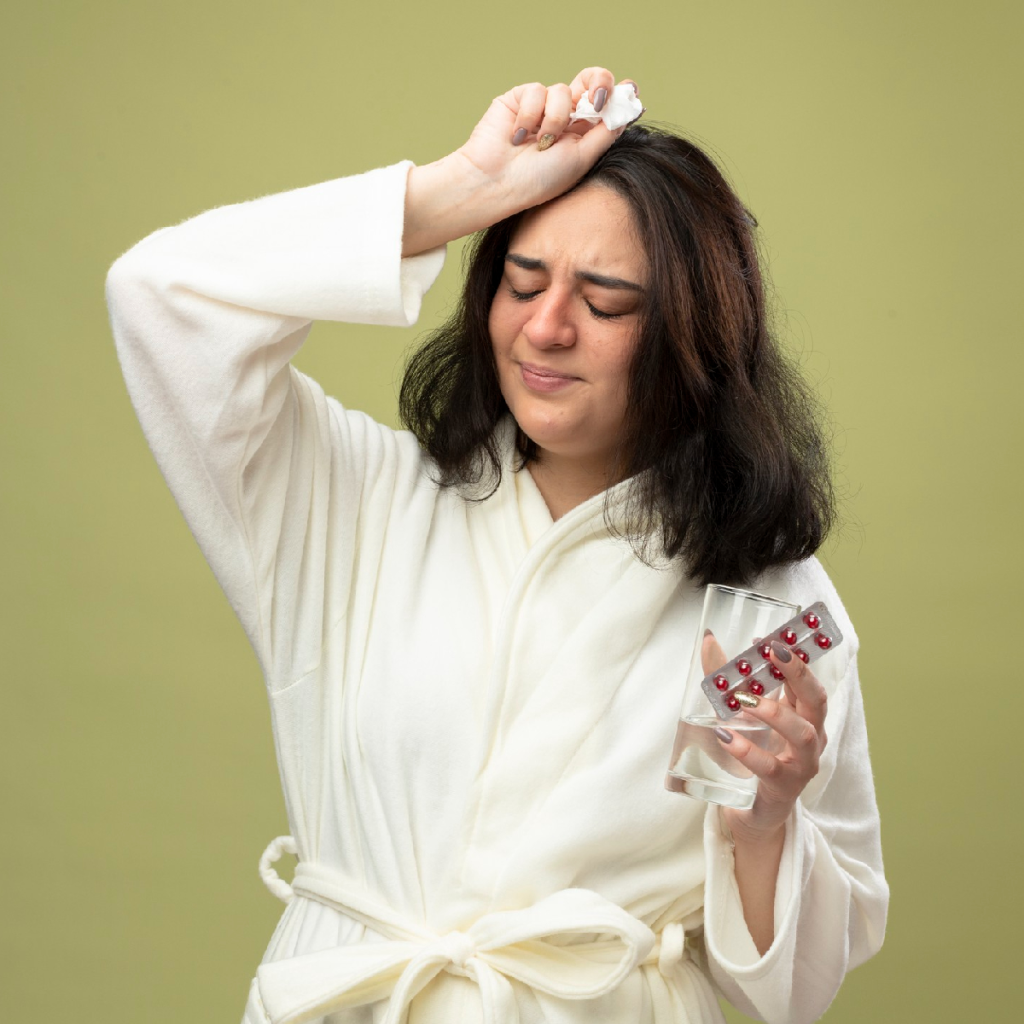Discover the potential side effects and interactions that may be associated with hair supplements.
Are There Potential Side Effects or Interactions Associated With Hair Supplements?
There has been a growing trend in recent years of people turning to hair supplements to achieve luscious, voluminous locks. But are these supplements all they’re cracked up to be? More importantly, are there any potential side effects or interactions that you should be aware of? Let’s dive into the world of hair supplements and explore what you need to know.

Understanding Hair Supplements
Hair supplements, as the name suggests, are dietary supplements specifically designed to promote hair growth and improve the overall health of your mane. They typically contain a combination of vitamins, minerals, herbal extracts, and proteins that play a role in hair health.
When it comes to achieving luscious locks, many people turn to hair supplements as a natural and convenient solution. These supplements are formulated with ingredients that are known to support hair growth and nourish the scalp. But what exactly is the role of hair supplements in hair growth? Let’s delve deeper into this fascinating topic.
The Role of Hair Supplements in Hair Growth
Hair supplements work by providing your body with the necessary nutrients and building blocks it needs to support healthy hair growth. They can help strengthen hair follicles, prevent breakage, and even stimulate new hair growth.
One of the key components found in hair supplements is biotin, also known as vitamin B7. Biotin is essential for the production of keratin, the protein that makes up the structure of your hair. By increasing the levels of biotin in your body through supplements, you can enhance the strength and elasticity of your hair, reducing the risk of breakage and promoting overall hair health.
In addition to biotin, hair supplements often contain other vitamins and minerals that are crucial for hair growth. For example, vitamin E is known for its antioxidant properties, which can protect the hair follicles from oxidative stress and damage. This, in turn, can promote healthy hair growth.
Furthermore, hair supplements may also include herbal extracts such as saw palmetto and horsetail extract. Saw palmetto has been traditionally used to support hair health and prevent hair loss, while horsetail extract is rich in silica, a mineral that is essential for collagen production and hair strength.
By providing your body with these essential nutrients and botanical extracts, hair supplements can help create an optimal environment for hair growth. They can nourish the scalp, strengthen the hair follicles, and improve blood circulation to the hair follicles, all of which are vital for healthy hair growth.
It is important to note that while hair supplements can be beneficial, they are not a magic solution for all hair problems. Hair health is influenced by various factors such as genetics, hormonal balance, and overall lifestyle. Therefore, it is always recommended to consult with a healthcare professional before starting any new dietary supplement regimen.
Common Ingredients in Hair Supplements
When it comes to hair supplements, there are several key ingredients that play a crucial role in promoting healthy hair growth and maintaining strong and shiny strands. In addition to the vitamins and minerals commonly found in these supplements, there are also herbal extracts and proteins that contribute to their effectiveness.
Vitamins and Minerals
One of the primary ingredients you’ll find in hair supplements are vitamins and minerals. These essential nutrients play a vital role in supporting healthy hair growth and ensuring that your body has everything it needs to produce strong and shiny strands.
Biotin, also known as vitamin B7, is a popular ingredient in hair supplements due to its ability to improve the overall health of hair. It helps to strengthen the hair follicles, preventing breakage and promoting hair growth. Vitamin E is another important nutrient that helps to improve blood circulation in the scalp, ensuring that the hair follicles receive the necessary nutrients for healthy growth. Vitamin C, zinc, and iron are also commonly included in hair supplements as they are known to promote hair strength and prevent hair loss.
Herbal Extracts
Many hair supplements also harness the power of herbal extracts that have been used for centuries to promote hair health. These natural ingredients provide nourishment to the scalp and support healthy hair growth.
Saw palmetto is a herbal extract that is known for its ability to block the production of DHT, a hormone that can contribute to hair loss. By inhibiting DHT, saw palmetto helps to maintain the health of hair follicles and prevent hair thinning. Horsetail extract, on the other hand, is rich in silica, a mineral that strengthens hair strands and improves their elasticity. Ginseng, a popular herb in traditional medicine, stimulates blood flow to the scalp, promoting hair growth and preventing hair loss.
Proteins and Amino Acids
Proteins and amino acids are the building blocks of hair, and it’s no wonder that they are often included in hair supplements. These ingredients help to strengthen the hair strands, increase their elasticity, and promote overall hair health.
Collagen, a protein found in abundance in the body, is known for its ability to improve hair strength and elasticity. By providing the necessary amino acids, collagen helps to repair damaged hair and prevent breakage. Keratin, another protein found in hair, helps to protect the hair from external damage and maintain its structure. Amino acids such as cysteine and methionine are also commonly included in hair supplements as they contribute to the production of keratin and help to strengthen the hair shaft.
By combining these essential ingredients, hair supplements provide the necessary nutrients and support for healthy hair growth. Whether you’re looking to improve the strength, thickness, or overall health of your hair, incorporating a hair supplement into your routine can be a beneficial addition.
Potential Side Effects of Hair Supplements
Digestive Issues
While hair supplements are generally considered safe, some people may experience digestive issues such as nausea, diarrhea, or stomach cramps. These side effects can occur due to various reasons, including the individual’s sensitivity to certain ingredients or the body’s reaction to the supplement’s formulation.
When ingested, hair supplements may interact with the digestive system, leading to temporary discomfort. The gastrointestinal tract plays a crucial role in the absorption and breakdown of nutrients. Sometimes, the introduction of new substances, such as those found in hair supplements, can disrupt the delicate balance of the digestive system, resulting in mild digestive disturbances.
If you experience any of these symptoms, it’s important to discontinue use and consult with your healthcare provider. They can help determine if the digestive issues are indeed related to the hair supplement and provide guidance on alternative options or adjustments to your regimen.
Allergic Reactions
Just like with any dietary supplement, there is a risk of allergic reactions when taking hair supplements. Some ingredients in hair supplements, such as herbal extracts or certain vitamins, may trigger allergic responses in susceptible individuals.
Allergies occur when the immune system identifies a particular substance as harmful and launches an immune response. In the case of hair supplements, allergic reactions can manifest as itching, swelling, rashes, or difficulty breathing. These symptoms can range from mild to severe and require immediate medical attention.
If you experience any signs of an allergic reaction after taking a hair supplement, it is crucial to seek medical attention promptly. A healthcare professional can evaluate your symptoms, provide appropriate treatment, and guide you on how to avoid similar reactions in the future.
Hormonal Imbalance
Hair supplements that contain ingredients like biotin or certain herbal extracts have the potential to affect hormonal balance. While this is rare, it’s important to be aware of the possibility, especially if you have pre-existing hormonal conditions or are taking hormonal medications.
The endocrine system, responsible for regulating hormones, is a complex network of glands that work together to maintain balance in the body. Certain substances, including those found in hair supplements, can influence the production, release, or activity of hormones.
If you have a pre-existing hormonal condition, such as polycystic ovary syndrome (PCOS) or thyroid dysfunction, it’s essential to consult with your healthcare provider before introducing any new supplements into your routine. They can assess the potential risks and benefits based on your specific health needs.
Additionally, if you are taking hormonal medications, it’s crucial to inform your healthcare provider about any hair supplements you plan to take. They can evaluate potential interactions between the supplement and your medication, ensuring your hormonal balance remains stable.
While the likelihood of experiencing hormonal imbalances from hair supplements is low, it’s always wise to prioritize open communication with your healthcare provider to make informed decisions about your health.
Interactions of Hair Supplements with Other Medications
When it comes to taking care of our hair, many of us turn to various supplements to promote hair growth and maintain its health. While hair supplements can be beneficial, it’s crucial to understand their potential interactions with other medications. Let’s explore some of the common interactions that hair supplements may have with certain drugs.

Interactions with Blood Thinners
If you’re taking blood thinners such as warfarin, it’s essential to speak with your healthcare provider before starting any hair supplement. Blood thinners are prescribed to prevent blood clots and reduce the risk of stroke or heart attack. However, some ingredients in hair supplements, like vitamin E or gingko biloba, may interact with blood thinners and increase the risk of bleeding.
For instance, vitamin E is known for its blood-thinning properties, which can be beneficial for some individuals. However, when combined with blood thinners, it can amplify their effects, potentially leading to excessive bleeding in certain situations. Similarly, gingko biloba, a popular herb used in hair supplements, has been associated with increased bleeding risk when used alongside blood thinners. Therefore, it’s crucial to consult with your healthcare provider to ensure the safe use of both medications.
Interactions with Hormonal Medications
Hair supplements that affect hormonal balance may interfere with the effectiveness of hormonal medications such as birth control or hormone replacement therapy. Hormonal medications are prescribed to regulate hormone levels and address various health conditions. However, adding a hair supplement to your routine without considering potential interactions may disrupt the delicate hormonal balance.
For example, some hair supplements contain ingredients like saw palmetto or biotin, which are believed to influence hormone levels. Saw palmetto is often used to support prostate health in men and may have anti-androgenic effects. However, if you’re taking hormonal medications, such as birth control pills or hormone replacement therapy, the interaction between these medications and the hair supplement may affect their efficacy. It’s crucial to consult with your doctor before combining these medications to ensure their safe and effective use.
Interactions with Other Supplements
Supplements, including hair supplements, are available in various forms, each containing a unique blend of ingredients. If you’re already taking other dietary supplements or multivitamins, it’s important to check for potential interactions with hair supplements.
Some ingredients in hair supplements, such as biotin or zinc, may interact with certain nutrients found in other supplements, leading to adverse effects or reduced efficacy. For example, zinc can interfere with the absorption of copper, iron, and calcium, affecting their bioavailability and potentially leading to deficiencies. Therefore, it’s crucial to read the labels carefully and consult with a healthcare professional if you’re unsure about combining different supplements.
In conclusion, while hair supplements can be a valuable addition to your hair care routine, it’s essential to be aware of any potential side effects or interactions. Understanding the interactions with blood thinners, hormonal medications, and other supplements is crucial for maintaining your overall health and well-being. Always do your research, read the labels, and consult with a healthcare professional if needed to ensure the safe and effective use of hair supplements.





